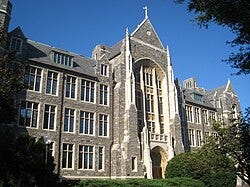New ISGAP Report Reveals Deep Qatari Influence at Georgetown University: The Top 5 Most Concerning Findings
Qatar’s Expanding Influence in U.S. Higher Education Raises National Security and Academic Concerns Over Radicalization and Legal Violations at American Universities
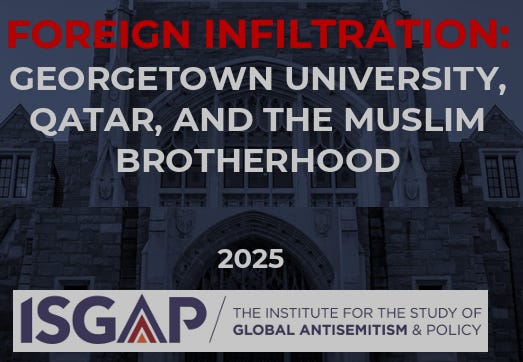
A comprehensive new report released by the Institute for the Study of Global Antisemitism and Policy (ISGAP) exposes the extensive financial and ideological influence exerted by Qatar on Georgetown University, particularly through its Qatar campus (GU-Q). The findings highlight troubling risks of foreign radicalization of American students and potential violations of U.S. laws governing foreign funding transparency and national security.
Top 5 Concerning Revelations from the ISGAP Report
1. Over $1 Billion in Qatari Funding with Limited Transparency
ISGAP documents that Georgetown University has received more than $1.069 billion from Qatari sources since 2005, primarily funneled through the Qatar Foundation, a government-controlled entity closely linked to Qatar’s ruling family. The report alleges that much of this funding has not been fully disclosed to U.S. authorities, potentially violating Department of Education reporting requirements and the Foreign Agents Registration Act (FARA). This lack of transparency obscures the true extent of foreign influence within one of America’s most prestigious universities.
2. Ideological Influence and Curriculum Control
The report details how Qatari funding has allowed the regime to shape academic content, faculty appointments, and research priorities at Georgetown, especially within its School of Foreign Service and Middle East-focused centers. GU-Q operates under Qatari laws that restrict academic freedom, including censorship of topics such as women’s rights, LGBTQ+ issues, and critical analysis of political Islam. This environment fosters ideological conformity aligned with Qatari and Muslim Brotherhood-linked perspectives, raising concerns about the radicalization of students exposed to such narratives.
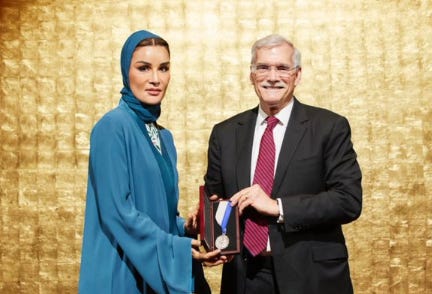
3. Promotion of Islamist and Anti-Israel Narratives
ISGAP highlights that Georgetown’s Qatar campus and affiliated centers have hosted speakers and disseminated views sympathetic to Islamist groups, including the Muslim Brotherhood and Hamas. The report points to the awarding of Georgetown’s President’s Medal to Sheikha Moza bint Nasser, a key Qatari royal who publicly praised Hamas leader Yahya Sinwar following the October 7, 2023, attacks. Such actions risk legitimizing extremist ideologies and contributing to a hostile campus climate for Jewish and pro-Israel students.
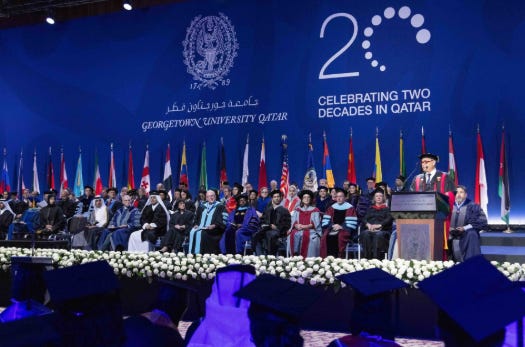
4. Pipeline to U.S. Policy and Intelligence Circles
Graduates and faculty linked to Georgetown’s Qatar programs increasingly occupy influential roles in U.S. government agencies, think tanks, and media organizations. ISGAP warns that this network may facilitate the transmission of Qatari-influenced ideologies into American foreign policy and intelligence decision-making, representing a strategic long-term soft power investment by Qatar.
5. Potential Violations of U.S. National Security and Legal Frameworks
Beyond academic concerns, the report raises alarms about possible breaches of U.S. law, including failure to report foreign gifts and influence as required by federal regulations. The blending of educational programs with ideological agendas tied to a foreign authoritarian regime poses risks to national security, especially given Qatar’s broader geopolitical ambitions and ties to Islamist groups.
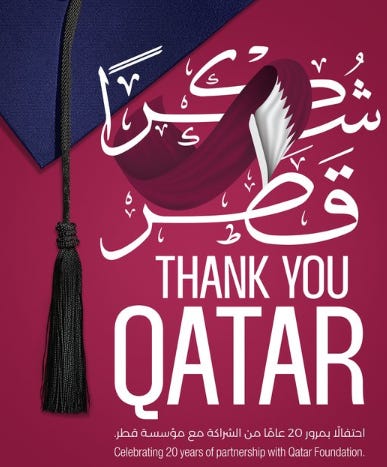
Implications and Calls for Action
The ISGAP report calls for urgent congressional hearings, comprehensive audits of foreign funding in U.S. universities, and enforcement of transparency laws to safeguard academic independence and national security. It urges Georgetown University to sever or radically reform its partnership with the Qatar Foundation and to publicly disclose the full extent of foreign influence on its campuses.
As the report underscores, the infiltration of foreign radical ideologies into American higher education threatens not only the integrity of academic institutions but also the ideological formation of future policymakers and leaders. The revelations at Georgetown serve as a cautionary tale about the broader risks posed by unchecked foreign funding in U.S. academia.
For full details, the ISGAP report “Georgetown University, Qatar, and the Muslim Brotherhood” is available for download.



